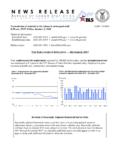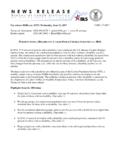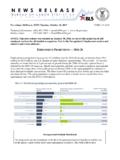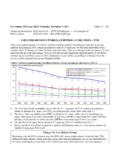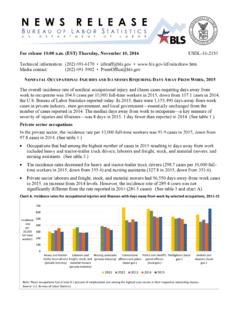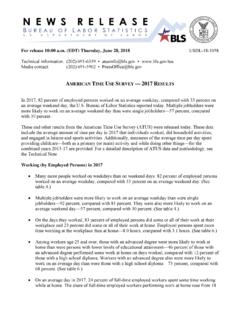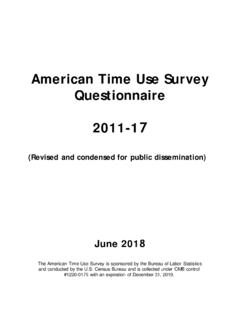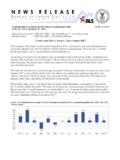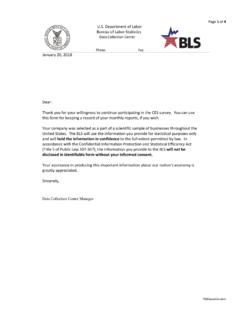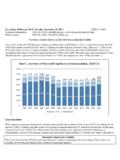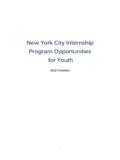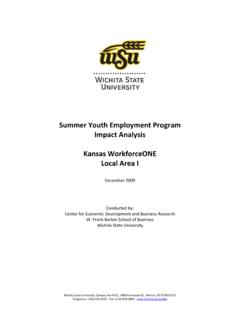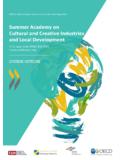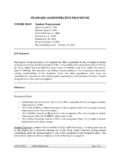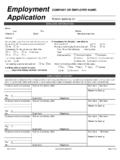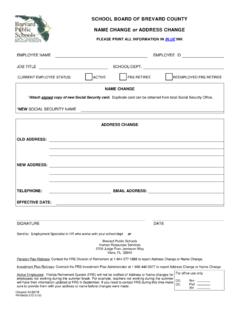Transcription of nterviewing is the most stressful part of the job …
1 14 Occupational Outlook Quarterly l summer 2000 Interviewing is the most stressfulpart of the job search for manypeople. But it doesn t have to be. In-terviews are an opportunity to showyou are an enthusiastic worker whowould do a job can make the most of that oppor-tunity by being prepared, presenting aprofessional demeanor, and describingyour qualifications Crosby is a contributing editor to the OOQ,(202) are many types of interviews:screening interviews, designed to whittlethe applicant pool; longer second andthird interviews, intended to help employ-ers make final selections; and telephone andvideo conferencing interviews, arranged tocapitalize on available these interviews often havedifferent purposes, they all require basicinterviewing skills.
2 Read on for adviceabout what to do before, during, and aftera job interview. The sidebar on page 17discusses ways to enlist good references,by Olivia CrosbyOccupational Outlook Quarterly l summer 2000 15 Seizing the opportunity and the joband the special feature on page 19 offerstips about job counselors say a good job inter-view starts well before the jobseeker andinterviewer meet. Preparation can be asimportant as the interview itself. Re-searching, practicing, and dressing appro-priately are the first steps to making themost of a job One of the best, but most fre-quently overlooked, ways to demonstrateenthusiasm for a job is to research boththe company and the position for whichyou are being interviewed. Employers saythey are impressed by arriving for an interview, youshould know what the company does,how large it is, any recent changes it hasundergone, and what role you could playin its organization.
3 Try to learn about thecompany s goals and values. With thesefacts, you can show how your qualifica-tions match the company s company itself is often the easiestplace to start your search. Many busi-nesses fill their websites with informationtailored to jobseekers. These sites ofteninclude a history of the company and adescription of its products and many companies human resourcesdepartments will send recruiting informa-tion if you request libraries and career centers alsohave valuable information about employ-ers, including companies annual reportsto shareholders, reports kept by local16 Occupational Outlook Quarterly l summer 2000chambers of commerce, trade journals,and business indexes, such as Hoover sBusiness Index and Dun and describing yourself.
4 Anotherimportant step in preparing for a job inter-view is to practice describing your pro-fessional characteristics. Think of ex-amples from past jobs, schoolwork, andactivities to illustrate important skills. Re-calling accomplishments beforehand,when you don t have to respond under in-terview pressure, will strengthen your an-swers during the actual interview will be different, andthere may always be surprising , interviewers suggest re-hearsing with a career counselor orfriend to gain confidence and poise. As astarting point, try to respond aloud to thefollowing:uHow would you describe yourself?uWhat did you like most about your lastjob?uWhat types of courses do you enjoymost?uWhy should I select you over other ap-plicants?
5 UWhat are your greatest strengths andweaknesses?uWhat are your hobbies?uTell me more about the project you de-scribed on your r sum .uDescribe a work or school-relatedproblem and how you solved me about a time you worked aspart of a are your short-term goals?uWhy do you want to work in this occu-pation and for this company?Each question gives you an opportu-nity to illustrate your favorable character-istics. When responding, focus on sub-jects related to the job. For example, ifasked to describe yourself, talk aboutyour professional characteristics andbackground, not your personal questions such as those abouthobbies or interests may seem irrel-evant. Interviewers ask these types ofquestions to learn about your personalityand test your interpersonal skills.
6 In addi-tion, answering questions about yourhobbies or interests allows you to high-light some of your other strengths. Par-ticipating in a sport might demonstrateteamwork; ability in a craft, such asneedlepoint, shows an attention to centers and libraries have manybooks with additional questions and pos-sible answers. The goal is not to memo-rize responses to these questions but tobecome comfortable speaking aboutyourself, your training and experience,and your career goals. Responding to in-terview questions should not sound as ifyou are reciting a the question, be ready to ac-centuate the positive. The interviewermight ask for a weakness or failure;choose one that does not affect your abil-ity to do the job, or describe a shortcom-ing you are working to overcome.
7 For ex-ample, if interviewing for an entry-leveljob, cite your lack of paid experience. Ifthere are weaknesses evident on yourr sum or transcript, such as being firedfrom a job or receiving poor grades, re-hearse an explanation before the inter-view in case you are asked about on what you learned from the expe-rience, being careful never to criticize aprevious employer or professionally. Securing a job ismuch easier if you look the part . A usefulguideline is to dress as you would for animportant day on the job, like a meetingwith a supervisor or a presentation to should be clean, well fitting,and wrinkle free. most employers expectjobseekers to wear a traditional two-piecesuit, preferably in a conservative colorsuch as navy blue, gray, or black.
8 The ob-ject is to look reliable, not trendy. ManyMake your first impression a good one by greeting the interviewer with a smile, a firmhandshake, and direct eye Outlook Quarterly l summer 2000 17employers say that women s skirts shouldbe knee-length or below. Polished,closed-toe shoes complete the profes-sional last-minute clothing disastersby trying on your suit a few days beforethe interview. And plan for the unex-pected: if you will wear a skirt, buy an ex-tra pair of stockings; if you have shoes thattie, get more shoelaces. Bring such extrasalong with you the day of the hair neat by tying it back, puttingit up, or cutting it short. Avoid cologne andperfume, large pieces of jewelry, andheavy or unnatural makeup. These distractthe interviewer from your the day of the interview, give yourselfplenty of time to get ready for and travelto the interview.
9 Plan to arrive 10 to 15minutes early. (Some career counselorssuggest making a test run to the interviewsite in advance to familiarize yourselfwith the travel route.)Consider carrying a briefcase to the in-terview. In addition to giving you a pro-fessional look, a briefcase serves a func-tion: it gives portability to things you llwant at the interview. These include a penand paper to record important informa-tion, such as the proper spelling of theinterviewer s name and the time and dateof followup interviews; copies of yourr sum or application and references; andexamples of your work, such as most people are nervouswhen interviewing. But remember: Youhave been asked to interview for the jobbecause the employer believes you couldbe right for it.
10 The interview is yourchance to confirm that belief and estab-lish reduce nervousness, interviewersrecommend getting a good night s sleepand maintaining your usual morningroutine if you never eat breakfast, forexample, don t eat a hearty morning mealon interview day. They also recommendcalling to mind some of your happiestmemories or proudest moments before ar-riving for the they remind jobseekers that eachopening you interview for is not the onlyone that exists. More than one companyrecruits for jobs. If one interview doesn tgo well, another impressions. The interview beginsthe moment you arrive. Everyone youmeet, from the receptionist to the hiringmanager, will form an impression of ensure the impression is positive, re-member that your words and mannerismswill affect the image you project.
